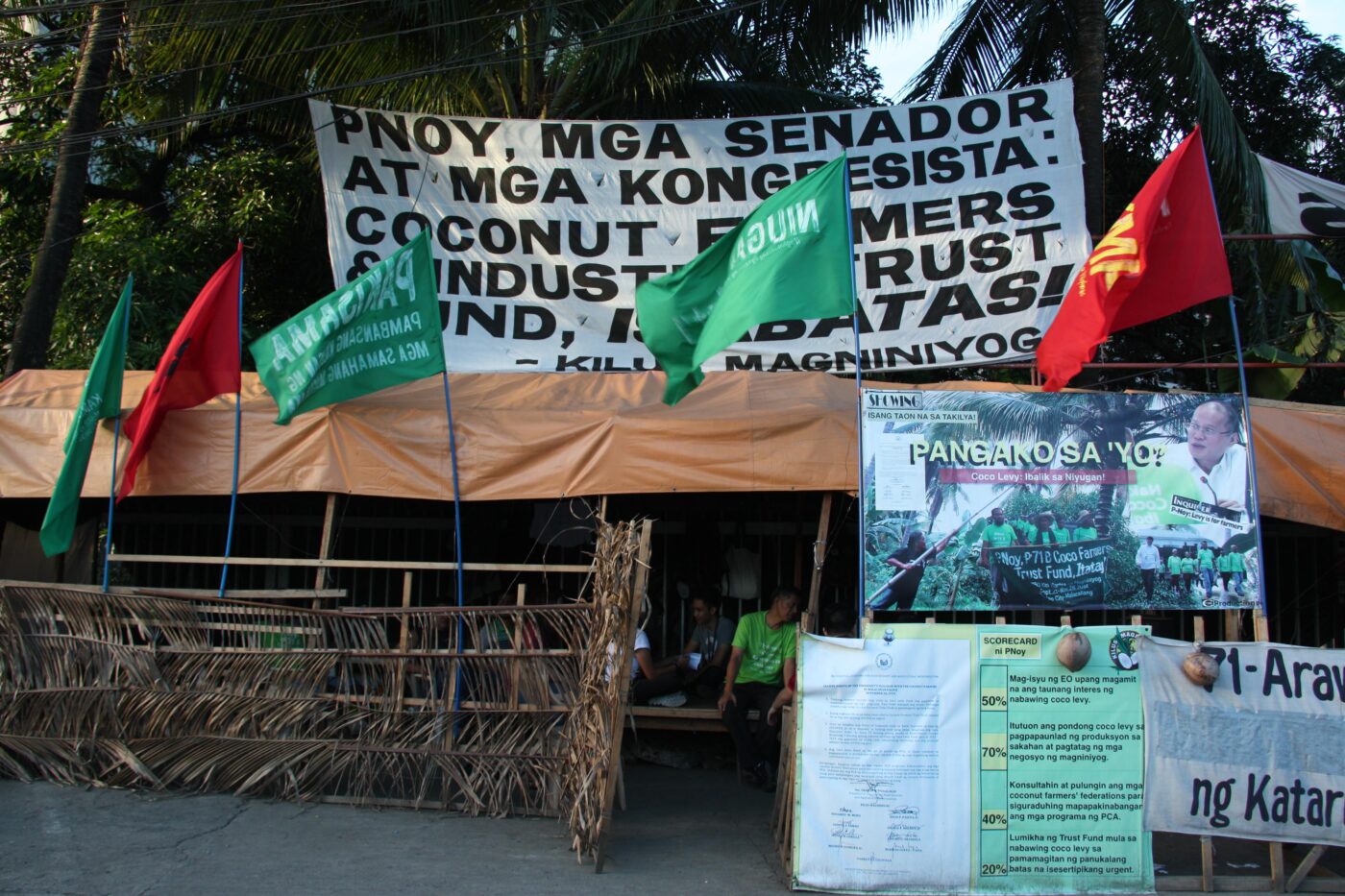In September 2014, 71 farmers marched from Davao to Malacañang to call for government action on the controversial Php 71 billion coco levy fund accumulated during the Marcos regime. One year on, coconut farmers still await the legislation promised by the government.
Festooned with the flags of the nine federations that make up Kilusan para sa Ugnayan ng Samahang Magniniyog (KILUS Magniniyog), a camp stands outside the Philippine Coconut Authority (PCA) building. Its roof is made of tarpaulin, its fence of wood. The white banner above it reads, “PNoy, mga senador, at kongresista: Coconut Farmers & Industry Trust Fund, isabatas!”
The camp has stood outside the PCA since September 21, exactly a year after coconut farmers marched an estimated 1,075 kilometers from Davao to the Malacañang to insist on their rights to the Php 71 B coco levy fund—a fund made up of taxes collected from the farmers during the Marcos regime.
The march, better known as KM71, resulted in a dialogue with President Benigno Aquino III, who agreed to certify the passage of the Coconut Farmers and Industry Trust Fund Bill as urgent.
A year later, coconut farmers have launched a 71-day campaign to insist on the urgent passage of the bill into law before the year ends.
Senate version preferred
In principle, the bill meets most of the demands of KILUS Magniniyog regarding the fund including the protection of the money, the use of its yearly interest for programs exclusively for coconut farmers, and the sector’s participation in decisions involving the fund, among others. The bill has so far been passed in the House of Representatives as House Bill 6135.
Farmers from the federations that comprise KILUS Magniniyog are to seek dialogue with senators regarding the Senate version of the bill, which is currently being deliberated on the committee level, on Wednesday, November 4.
According to coconut farmer Domingo “Ka Jun” Pontiveros Jr., the Senate version of the bill is more attuned with their concerns, specifically regarding the composition of the committee set to oversee the fund and its resulting programs.
Pontiveros pointed out that the Senate version would afford more committee representation to the sector, with five slots for coconut farmers and four for government representatives. HB 6135 affords more representation to the latter, with seven seats for government representatives and six for coconut farmers.
In addition, the House version gives PCA the sole implementing power over programs meant for coconut farmers when it should be more collaborative, Pontiveros said. He hopes that the Senate and House versions will be reconciled in a bicameral agreement with more attention to farmers’ interests by December 1, which will mark the end of their 71-day camp outside the PCA.
Levy left in limbo
The controversy over the coconut levy fund goes all the way back to 1971, when Congress passed R.A. 6260, imposing a levy of 55 centavos for every 100 kilograms of coconut product.
After the enactment of Martial Law in the country, President Marcos further issued Presidential Decrees reorganizing the coconut industry under government control. With the consolidation of the coco levy fund under the United Coconut Planters Bank (UCPB), Marcos gave controlling stake of the UCPB to Eduardo “Danding” Cojuangco’s San Miguel Corporation (SMC).
With personal discretion given to Cojuangco, it is alleged that he, together with then PCA Chair Juan Ponce Enrile and Marcos, used the coco levy fund to personal ends, resulting in the neglect of the nation’s coconut farmers.
After the People Power Revolution, the Presidential Commission on Good Government issued a sequestering of all assets acquired through the coco levy fund. This included shares of stock in the UCPB. However, Cojuangco regained control of UCPB after the election of President Joseph Estrada in 1998.
In succeeding Sandiganbayan resolutions, the anti-graft court ruled that the shares in both UCPB and SMC purchased through the coco levy fund were not entitled to Cojuangco and in fact constituted public property.
Farmers, students remain unfazed
At present, farmers and students continue to fight for a fair and equitable resolution of the coco levy fund scam.
According to the Secretary-General of the Ateneans for Agrarian Reform Movement (AFARM) Lanz Espacio, the coconut farmers form an integral part in the development of the nation’s economy.
“We cannot begin speaking of ‘inclusive development’ when sectors such as the coconut farmers remain at the margins, even decades after Martial Law ended,” said Espacio. “It is important, at least for AFARM, that amidst the ‘booming economy’ this administration is proud of, the most impoverished Filipinos should get a chance at having better lives.”
According to him, coconut farmers constitute the poorest among society, earning an average of Php 18,000 a year. The appalling conditions are enough to warrant special consideration by the national government.
However, Espacio stressed that the issue of the coco levy fund speaks of a wider lack of progress in rural areas. He said that the elections are bound to serve as a jumping point for further discourse and dialogue.
“Since the national elections is one of the bigger events of this academic year, [AFARM] will be lobbying for rural development as an integral issue in the platforms of the candidates running for the elections,” Espacio said.
In all this, farmers such as Pontiveros remained optimistic about the future of Philippine agriculture. He said that agriculture is, and remains, the backbone of the economy.
“Kapag hindi tayo nag-umpisa sa agrikultura, ano ang puwede nating umpisahan?” (If we do not begin with agriculture, what is there to begin with?” he said.





It’s 1,750 km not 1,075 km. Pls correct